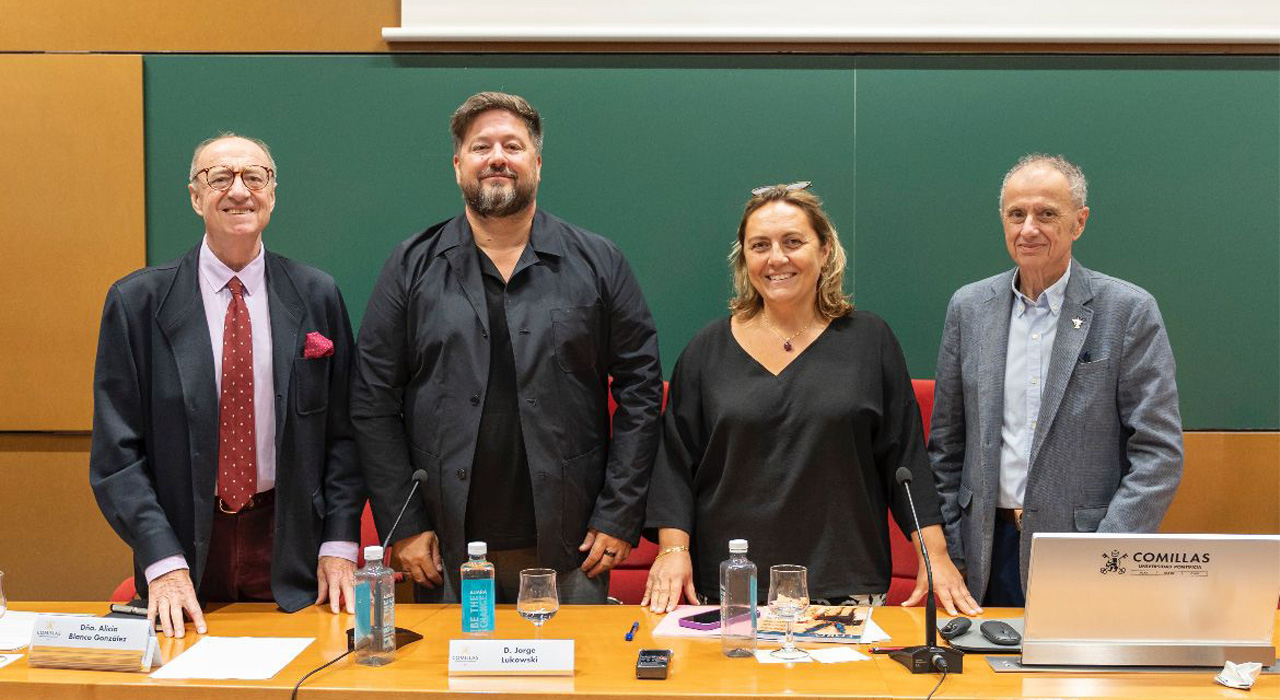NEORIS apela às empresas para que vejam o investimento em ESG como uma oportunidade para transformar os seus modelos de negócio - Asset Display Page

NEORIS apela às empresas para que vejam o investimento em ESG como uma oportunidade para transformar os seus modelos de negócio

NEORIS apela às empresas para que vejam o investimento em ESG como uma oportunidade para transformar os seus modelos de negócio
Outubro 02, 2024
Madri, 26 de setembro de 2024. A NEORIS, aceleradora digital global com mais de 20 anos de experiência na transformação digital de grandes empresas, participou como palestrante no evento intitulado "O Papel das Empresas no Século 21", organizado pelo Fórum Social Ecumênico em colaboração com a Universidade Comillas e a Universidade Rey Juan Carlos. Este encontro reuniu os principais especialistas do âmbito acadêmico e empresarial para discutir o papel crescente da responsabilidade social corporativa (RSC), os critérios ESG (ambientais, sociais e de governança) e como a tecnologia está transformando o cenário dos negócios.
Entre os participantes, incluindo a Jorge Lukowski, Diretor Global de Marketing e Comunicação da NEORIS, se destacaram figuras renomadas como:
- Luis Bameule (empresário)
- Fernando Flores Maio (Fórum Social Ecumênico)
- Francisco Marhuenda (diretor do jornal La Razón)
- Stefano Zamagni (Universidades de Bolonha e Johns Hopkins, Academia de Ciências Sociais do Vaticano)
- José Luis Fernández Fernández e Javier Márquez Gil (Universidade Comillas)
- Jorge Urosa Sánchez, Alicia Blanco González e Sandra Escamilla Solano (Universidade Rey Juan Carlos)
- Marta González Álvarez (Universidade de Burgos)
O evento, realizado em formato híbrido, contou com mais de 100 participantes, tanto presenciais quanto virtuais, que participaram ativamente do debate sobre a crescente importância do papel social das empresas no século 21.
O poder transformador das empresas e da tecnologia
Jorge Lukowski destacou o impacto transformador do ESG e da tecnologia no século 21. Durante sua fala, ele ressaltou que as empresas não devem apenas investir em ESG, mas devem vê-lo como uma oportunidade de transformar seus modelos de negócios, garantindo que suas decisões não só gerem valor financeiro, mas também contribuam para um futuro mais sustentável.
Também mencionou que investir em critérios ESG não apenas mitiga riscos financeiros, regulatórios e de reputação, mas também aumenta a competitividade e a eficiência operacional das empresas. Um estudo recente da Harvard Business Review mostra que as empresas que adotam políticas ESG podem reduzir seus custos operacionais em até 16%, ao mesmo tempo em que melhoram sua competitividade no longo prazo.
"A tecnologia é a chave para tornar essas estratégias de negócios e sustentabilidade uma realidade", disse o porta-voz ao se referir ao uso de inteligência artificial, blockchain e computação na nuvem como ferramentas essenciais para garantir maior transparência e rastreabilidade nas operações comerciais. Um exemplo disso é o Active Trac, uma solução que combina a mais recente tecnologia em sensores e posicionamento por satélite com análise de dados para gerar uma plataforma robusta baseada na nuvem, onde o desempenho de frotas pode ser monitorado e otimizado em tempo real.
A dimensão ética e social da tecnologia
Durante sua fala, Lukowski também destacou o papel da tecnologia na melhoria da dimensão social e ética das empresas. Ressaltou que as tecnologias emergentes, como a inteligência artificial, estão contribuindo significativamente para melhorar os sistemas de saúde pública e desenvolver soluções para populações vulneráveis. Essas ferramentas permitem que as empresas não só operem com mais eficiência, mas também criem valor social e ético em suas comunidades.
Um exemplo disso é o Impulso Talento, um programa global projetado para treinar jovens em habilidades tecnológicas, promovendo a inclusão laboral e contribuindo para fechar a lacuna digital em comunidades vulneráveis. Esta iniciativa reforça o foco da NEORIS num futuro mais equitativo e sustentável, alinhando os seus valores corporativos com as expectativas das novas gerações.
Um debate em evolução
O fórum ofereceu uma plataforma dinâmica onde acadêmicos, empresários e especialistas debateram sobre a evolução do papel das empresas na economia global. Foi discutida a crescente responsabilidade das organizações em integrar a sustentabilidade e a ética em seus modelos de negócios, a fim de gerar um impacto positivo no nível financeiro e social. Foram também abordadas as preocupações de alguns economistas, que argumentam que as empresas devem limitar-se a cumprir a lei sem assumir responsabilidades adicionais.
Durante o evento, Stefano Zamagni criticou a visão reducionista da empresa como um simples "nexo de contratos", defendendo que as empresas devem recuperar sua dimensão ética e assumir um papel ativo na mudança social. Zamagni argumentou que a responsabilidade social corporativa não deve ser vista como um custo adicional, mas como uma necessidade estratégica para empresas que desejam ser relevantes no futuro.
Com sua participação, Jorge Lukowski reafirmou o compromisso da NEORIS com a transformação digital e a sustentabilidade, posicionando a empresa como um referente na implementação de tecnologia para avançar nas práticas ESG. Esta intervenção reforça a visão da NEORIS de um modelo de negócio mais ético e responsável, que não só busca a rentabilidade, mas também o bem-estar social e ambiental.
Destaque
-
Otimizar, inovar, liderar: O novo ritmo do sucesso com o SAP S/4HANA
Maio 16, 2025
-
Inovação com perspectiva de gênero: Como a diversidade impulsiona um futuro tecnológico mais inclusivo
Abril 23, 2025
-
Os agentes de IA revolucionam a experiência do cliente e aprimoram o talento humano
Abril 22, 2025
-
EPAM NEORIS inaugura seu hub de Inteligência Artificial em Madrid
Abril 2, 2025
Mais visto
-
IA, SIM Swap e disrupção: as tendências mais notáveis do MWC 2024
Março 25, 2024
-
NEORIS se convierte en Socio del Año de Microsoft
Julho 23, 2020
-
Acelerador global de digital NEORIS lança plataforma de software para ajudar empresas a gerir e acompanhar riscos de coronavirus
Março 27, 2020
-
Microsoft reconhece a NEORIS como Parceira do Ano para SAP no AZURE
Julho 23, 2020










